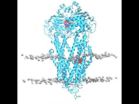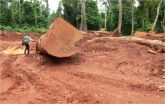The research suggests genetic inheritance is much more important in testicular cancer than in most other cancer types, where genetics typically accounts for less than 20 per cent of risk.
The findings suggest testing for a range of genetic variants linked to testicular cancer could be effective in picking out patients who are at substantially increased risk - potentially opening up ways of preventing the disease.
Scientists at The Institute of Cancer Research, London, along with colleagues in Germany, Sweden and the US, used two independent approaches to analyse the risk of testicular germ cell tumours - easily the most common type of testicular cancer.
Their research, published in the journal Scientific Reports and funded by the Movember Foundation, The Institute of Cancer Research (ICR) and Cancer Research UK, is the largest study ever to explore testicular germ cell tumours in detail.
Researchers first used statistical analysis to examine patterns of ancestral testicular cancer in family groups across 15.7 million people from the Swedish Population Registry cancer family database, including 9,324 cases of testicular cancer.
They then looked in detail at the genetic code of 6,000 UK men from two previous testicular cancer studies, 986 of whom had been diagnosed with the disease.
The combined analysis revealed that 49 per cent of all the possible factors contributing to testicular cancer risk are inherited.
It found that the inherited risk comes from a large number of minor variations in DNA code, rather than one faulty gene with a big effect.
Although substantial inroads have been made over the last five years at the ICR into identifying mutations associated with risk of testicular cancer, the study also showed that these known mutations only account for 9.1 per cent of the risk of developing the disease. Therefore the majority of the genetic variants that raise testicular cancer risk have yet to be identified.
Identifying more of these 'hidden' mutations could allow doctors to screen men for testicular cancer risk, increasing the chance of preventing the disease or catching it early.
Dr Clare Turnbull, Senior Researcher in Genetics and Epidemiology at The Institute of Cancer Research, London, said:
"Our study has shown that testicular cancer is a strongly heritable disease. Around half of a man's risk of developing testicular cancer comes from the genes he inherits from his parents - with environmental and behavioural factors contributing to the other half.
"Our findings have important implications in that they show that if we can discover these genetic causes, screening of men with a family history of testicular cancer could help to diagnose those at greatest risk, and help them to manage that risk.
"But our study also shows that much work remains to be done. There are a lot of genetic factors that cause testicular cancer which we are yet to find - so the first step must be to identify the genetic drivers of testicular cancer so we can develop new ways to prevent it."
Sam Gledhill, the Movember Foundation's Global Manager for Testicular Cancer Programmes, said:
"This is a significant development in the fight for a world where no man dies of testicular cancer. Dr Turnbull and her team at the ICR have generated important evidence to demonstrate that genetic factors might in the future help identify men and boys who have a higher risk of developing testicular cancer. These discoveries help to unlock the mysteries of this relatively poorly understood cancer and may ultimately identify potential treatment targets to fight this disease.
INFORMATION:
"The Movember Foundation and the ICR have shared a valuable partnership to date and we are delighted to confirm that we will continue to support this work from the proceeds of the 2015 Movember campaign. To help us to continue to support world-changing research, like that of Dr Turnbull and her team, we encourage you to support the 2015 Movember campaign by visiting http://www.movember.com."
Notes to editors
For more information contact Henry French on 020 7153 5582 or henry.french@icr.ac.uk. For enquiries out of hours, please call 07595 963 613.
The Institute of Cancer Research, London, is one of the world's most influential cancer research institutes.
Scientists and clinicians at The Institute of Cancer Research (ICR) are working every day to make a real impact on cancer patients' lives. Through its unique partnership with The Royal Marsden NHS Foundation Trust and 'bench-to-bedside' approach, the ICR is able to create and deliver results in a way that other institutions cannot. Together the two organisations are rated in the top four cancer centres globally.
The ICR has an outstanding record of achievement dating back more than 100 years. It provided the first convincing evidence that DNA damage is the basic cause of cancer, laying the foundation for the now universally accepted idea that cancer is a genetic disease. Today it leads the world at isolating cancer-related genes and discovering new targeted drugs for personalised cancer treatment.
As a college of the University of London, the ICR provides postgraduate higher education of international distinction. It has charitable status and relies on support from partner organisations, charities and the general public.
The ICR's mission is to make the discoveries that defeat cancer. For more information visit http://www.icr.ac.uk
ABOUT THE MOVEMBER FOUNDATION
The Movember Foundation is a global charity raising funds and awareness for men's health. These funds deliver breakthrough research and support services to help men live happier, healthier and longer lives.
The Foundation is responsible for the sprouting of millions of moustaches around the world in November when men become walking talking billboards for men's health. Mo Bros start the month clean-shaven, and then grow and groom their moustache all month long.
The Movember journey began in 2003 with a few mates in a pub in Melbourne, Australia. The goal was simple - to create a campaign promoting the growth of the moustache among like-minded people and have fun along the way. The movement is about real men growing real moustaches, talking about real issues to help change the face of men's health.
Since 2003, five million have joined the Movember men's health movement around the world and raised £400m, funding over 1000 programmes through impact investments that focus on prostate cancer, testicular cancer, poor mental health and physical inactivity.
Funds are directed to men's health programmes which are shaped by Movember's vision to have an everlasting impact on the face of men's health with programme areas focusing on awareness and education, living with and beyond cancer, staying mentally healthy and research. Programmes are delivered by the Movember Foundation and its men's health partners in each country. Further information about how Movember's funds are invested can be found at Movember.com
About Cancer Research UK
Cancer Research UK is the world's leading cancer charity dedicated to saving lives through research.
Cancer Research UK's pioneering work into the prevention, diagnosis and treatment of cancer has helped save millions of lives.
Cancer Research UK receives no government funding for its life-saving research. Every step it makes towards beating cancer relies on every pound donated.
Cancer Research UK has been at the heart of the progress that has already seen survival in the UK double in the last forty years.
Today, 2 in 4 people survive their cancer for at least 10 years. Cancer Research UK's ambition is to accelerate progress so that 3 in 4 people will survive their cancer for at least 10 years within the next 20 years.
Cancer Research UK supports research into all aspects of cancer through the work of over 4,000 scientists, doctors and nurses.
Together with its partners and supporters, Cancer Research UK's vision is to bring forward the day when all cancers are cured.
For further information about Cancer Research UK's work or to find out how to support the charity, please call 0300 123 1022 or visit http://www.cancerresearchuk.org. Follow us on Twitter and Facebook.


